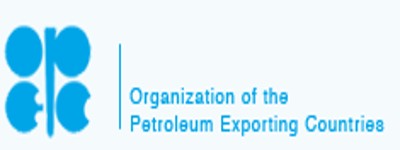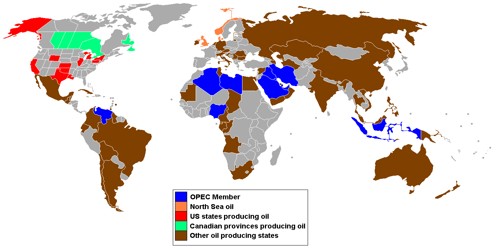Functions of Organization of Petroleum Exporting countries (OPEC)
The Organization of the Petroleum Exporting Countries (OPEC) is a group consisting of 14 of the world’s major oil-exporting nations. OPEC member countries produce about 40.1 percent of the World’s crude oil and 16.1 percent of its natural gas. Sometimes OPEC Policies Work Sometime they don’t.
OPEC was founded in 1960 to coordinate the petroleum policies of its members and to provide member states with technical and economic aid. In 1999 OPEC met and established strict production quota to try to raise prices. It seemed to work so well that by the third quarter of the year prices had nearly doubled and prices remained within OPEC’S target band until the terrorist attacks of September 11, 2001. Countries that belong to OPEC include Iran, Iraq, Kuwait, Saudi Arabia, and Venezuela (the five founders), plus the United Arab Emirates, Libya, Algeria, Nigeria, and five other countries.

OPEC is a cartel that aims to manage the supply of oil in an effort to set the price of oil on the world market, in order to avoid fluctuations that might affect the economies of both producing and purchasing countries. It is an intergovernmental organization, as opposed to a nongovernmental organization (NGO), such as Oxfam or Amnesty International.
OPEC’s principal objectives are as follows:
- to coordinate & unify the petroleum policies of member countries and to determine the best means for safeguarding their individual and collective interests;
- to seek ways and means of ensuring the stabilization of prices in international oil markets with a view to eliminating harmful and unnecessary fluctuations; and
- to provide an efficient economic and regular supply of petroleum to consuming nations and a fair return on capital to those investing in the petroleum industry
Keeping Oil prices high has some downside for OPEC. Competition from non-OPEC countries increases because the revenues accruing to the competitions are higher. Because some OPEC countries are putting up roadblocks to the production. Major Producers like BP, Exxon Mobil, and Shell are investing heaving in areas like the Caspian Basin the Gulf of Mexico, and Angola and are trying to enter into areas like the Russian Federation. Productions in these areas are expected to grow twice as fast as in the 1900s and this growth should continue until 2010.
Another Problem is that higher Oil prices could depress growth worldwide and thus lower demand for Oil.
Because commodities are the raw material used in the production process. It is important for managers of companies that use commodities to underhand the factors that influence their prices. During the Asian financial crisis, when commodity prices collapsed, commodity exporters suffered but commodity benefited from the lower commodity cost.
OPEC seeks to ensure the stabilization of oil prices in the international oil markets, with a view to eliminating harmful and unnecessary fluctuations, due regard being given at all times to the interests of oil-producing nations and to the necessity of securing a steady income for them. OPEC’s power for most countries has been able to avoid competitive pressure to improve their industries and some are, therefore, decades out of date.
















